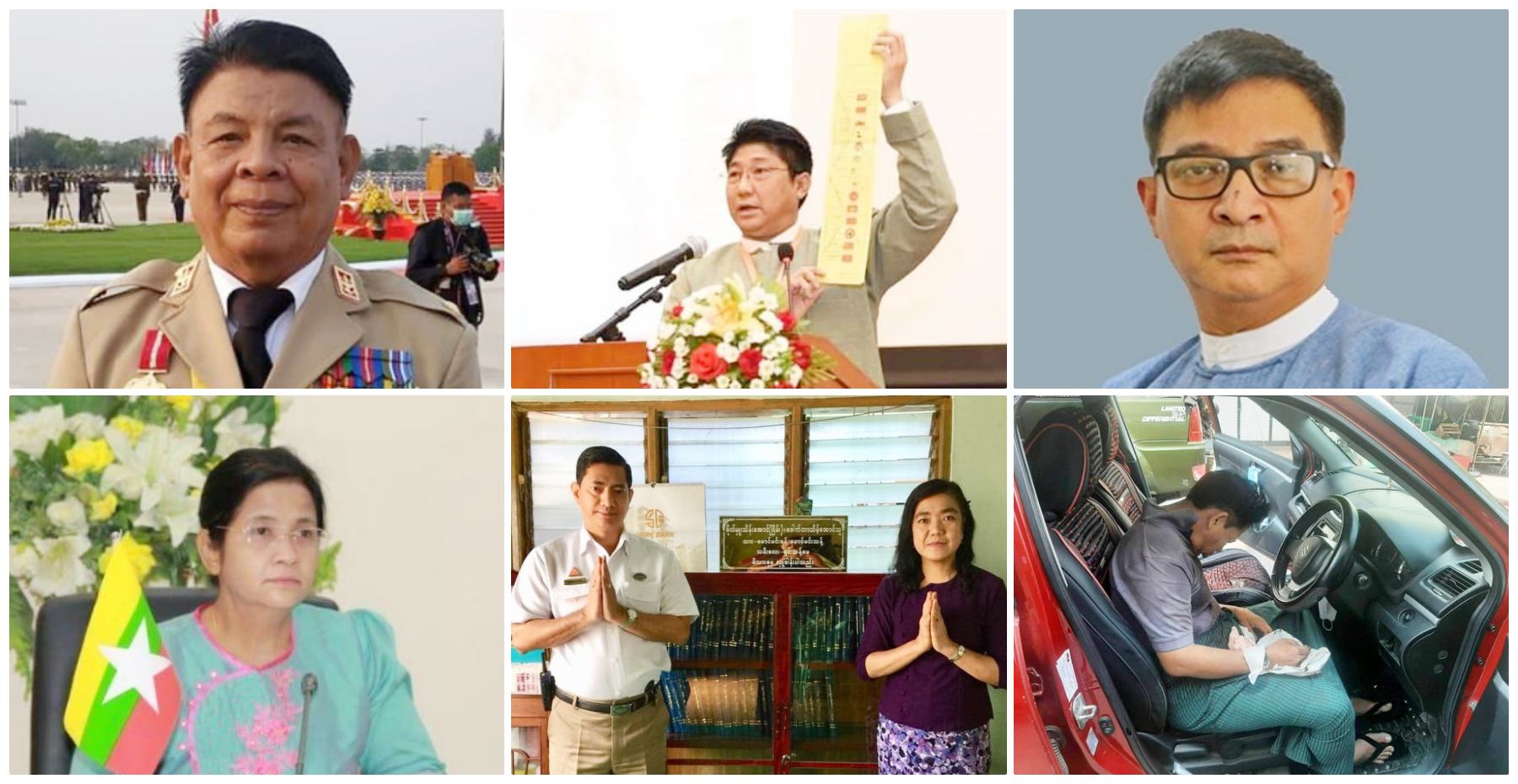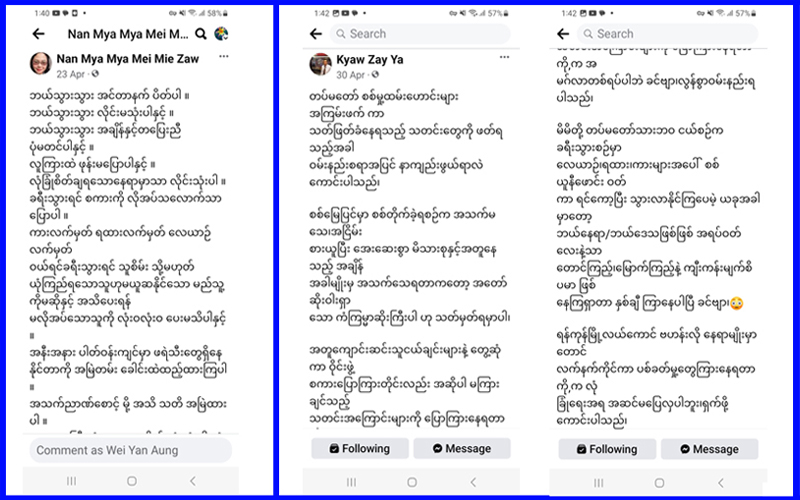Junta lobbyists and members of the military’s proxy Union Solidarity and Development Party (USDP) are in a state of panic and have been urging each other to exercise caution following a spate of fatal attacks on junta officials, former military officers and their associates in towns.
On April 22, the junta-appointed Union Election Commission (UEC)’s deputy director-general, Sai Kyaw Thu, was shot dead in broad daylight in Yangon.
The assassination sent shock waves through military supporters. The following day, USDP spokeswoman Daw Nan Mya Mi Mi Zaw posted a long Facebook warning for military supporters to “turn off mobile data wherever they go, not make or answer phone calls in public, not post pictures in real-time when they travel, speak no more than necessary during trips, and bear in mind there could be watermelons [pro-democracy informers inside the military] around them.”
Other well-known lobbyists also urged their peers to exercise caution amid rising dangers.
The UEC also organized meetings focusing on safety of its members in Naypyitaw.
Led by former Major-General Soe Thein, the election body is one of the pillars of the junta. Its director-general Aung Myo Lwin brought the lawsuit that led to the jailing of civilian president U Win Myint, state counselor Daw Aung San Suu Kyi and president’s office minister U Min Thu for allegedly abusing their power to influence the former election commission.
Sai Kyaw Thu, who was assassinated by urban revolutionary group ‘For the Yangon,’ was a prosecution witness in the case. Plaintiff Aung Myo Lwin and other prosecution witnesses will now be dreading that they might also be killed.
Sai Kyaw Thu’s killing came amid spate of assassinations targeting pro-regime figures.
In March, regime-allied lawyer Min Tayzar Nyunt Tin was fatally shot in Thanlyin.

Former lieutenant-colonel Aung Nyi Tun and two others were also killed in Thanlyin on April 18.
On April 29, one week after Sai Kyaw Thu was gunned down, retired major U Ye Min Than was assassinated by the Bahan’s Guerrilla Force.
Other high-profile targets have included the junta-controlled central bank’s vice governor Daw Than Than Swe, military-owned Mytel Telecom’s chief financial officer U Thein Aung, and retired Brigadier-General Ohn Thwin, who was the mentor of deputy junta chief Soe Win.
Daw Than Than Swe was the only one to survive assassination attempts and has since been promoted to central bank governor.
Kyaw Zeya, a former lieutenant colonel and National League for Democracy lawmaker who became vice chair of the People’s Pioneer Party led by junta social welfare minister Thet Thet Khine, wrote on Facebook that it was tragic and unfair that former military personnel were being killed. They were being targeted while living a peaceful retirement with their families after surviving battles during military service, he wrote.
Kyaw Zeya is now in the process of registering his new Union Peace and Unity Party with the UEC.
Chats with former military classmates were now overshadowed by talk of the killings, he added. Once they could walk with their heads held high on planes, trains and buses, but for more than a year now they have had to wear civilian clothes in public and keep a watchful eye wherever they go, he complained.
Except for certain individuals like Khin Yi, the ex-Brigadier General and current USDP chair who lives in a heavily guarded residence in Naypyitaw and boasts a team of personal bodyguards, former military officers are now living in fear.

Many former generals, officers, and families of junta-appointed ministers have fled Yangon and Mandalay to the regime’s administrative seat of Naypyitaw following the attacks. USDP members, military supporters, and family members of ex-military officers living in war zones have also sought safety by relocating to Naypyitaw.
“Secret notices have been issued to every department urging staff to stay vigilant for security threats, citing attacks on officials from administrative bodies and civil servants,” a staff officer from Naypyitaw said.
“The notices advise staff to travel by plane when necessary. Many of the family members of former generals have moved to Naypyitaw following assassinations. Some have bought houses here while others are renting.”
As those with ties to the military flock to Naypyitaw as a safe haven, junta chief Min Aung Hlaing has been tightening his own personal security. He rarely leaves his military office compound except to attend meetings at the presidential residence, official ceremonies, or for occasional visits to the giant Maravijaya Buddha Image he is having built on Naypyitaw’s outskirts. He frequently urges his officers and their families to be aware of their security.
Generals and their family members are also not allowed to leave the military office compound without permission.
Despite the presence of sandbag-fortified bunkers and checkpoints at major intersections, the abode of the generals is still prone to resistance attacks.
In February and March, blasts rocked the home of former Upper House deputy speaker and current USDP central consultative committee member Myat Nyein, and the Mandalay Paradise Restaurant owned by former agriculture and irrigation director-general U Kyaw Myint Hlaing, who has close ties to former military dictator Than Shwe.
Last Wednesday (May 3), urban guerillas attacked a junta security checkpoint in a neighborhood of former military officers and junta-appointed ministers in Naypyitaw’s Ottarathiri Township.

















